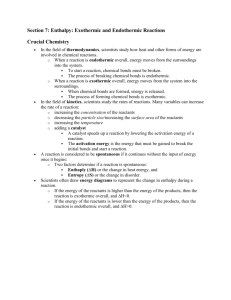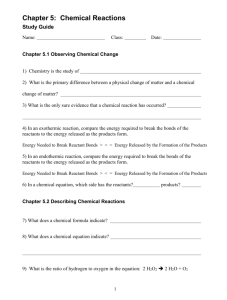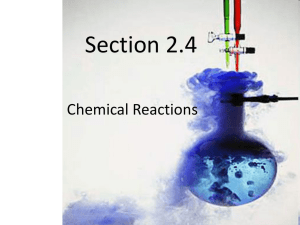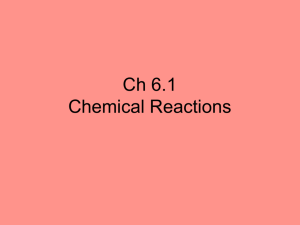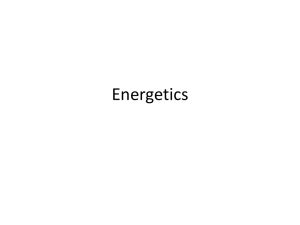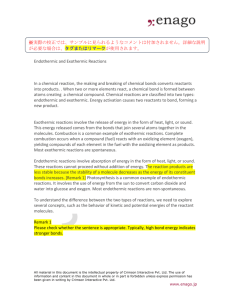A propane grill is the scene of a chemical reaction. The reactants
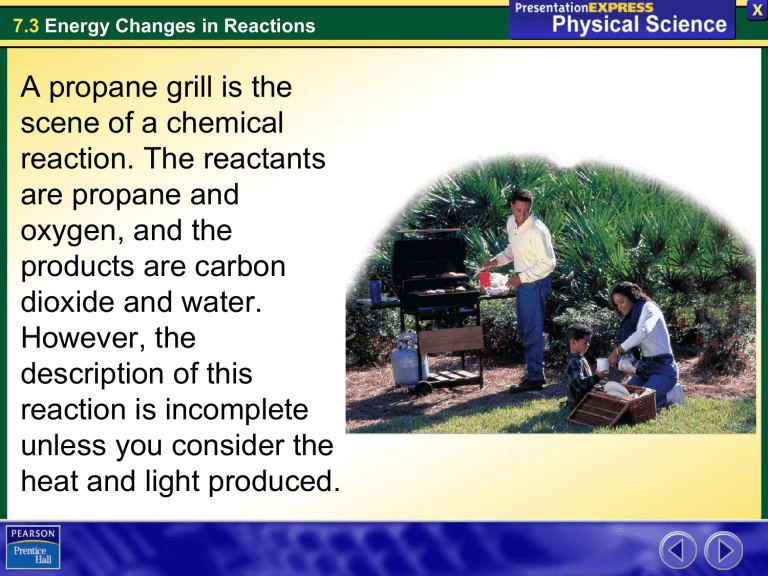
7.3 Energy Changes in Reactions
A propane grill is the scene of a chemical reaction. The reactants are propane and oxygen, and the products are carbon dioxide and water.
However, the description of this reaction is incomplete unless you consider the heat and light produced.
7.3 Energy Changes in Reactions
Chemical Bonds and Energy
Heat produced by a propane grill is a form of energy.
C
3
H
8
+ 5O
2
3CO
2
+ 4H
2
O + Heat
Chemical energy is the energy stored in the chemical__________of a substance.
A propane molecule has ten single covalent bonds.
The chemical energy of a propane molecule is the energy stored in these bonds.
Oxygen, carbon dioxide, and water molecules also have energy stored in their chemical bonds.
7.3 Energy Changes in Reactions
Chemical Bonds and Energy
Energy changes in chemical reactions are determined by changes that occur in chemical bonding.
Chemical reactions involve the breaking of chemical bonds in the reactants and the formation of chemical bonds in the ____________.
In the combustion of propane, the bonds in propane and oxygen molecules are broken, while the bonds in carbon dioxide and water molecules are formed.
7.3 Energy Changes in Reactions
Chemical Bonds and Energy
Breaking Bonds
In order for the combustion of propane to occur, all the chemical bonds in the reactants (propane and oxygen) must be broken. The formation of the chemical bonds in the products then completes the reaction.
Breaking chemical bonds requires ___________.
A_______provides enough energy to break the bonds of reacting molecules and get the reaction started.
7.3 Energy Changes in Reactions
Chemical Bonds and Energy
7.3 Energy Changes in Reactions
Chemical Bonds and Energy
Forming Bonds
For each molecule of propane burned, three molecules of carbon dioxide and four molecules of water are formed.
• Six C=O double bonds and eight O—H single bonds are formed.
• The formation of chemical bonds releases energy as the elements are rearranged into CO
2
H
2
O. and
• The _________________given off result from the formation of new chemical bonds.
7.3 Energy Changes in Reactions
Exothermic and Endothermic Reactions
Energy flows into and out of chemical changes.
During a chemical reaction, energy is either released or absorbed.
Exothermic Reactions
A chemical reaction that releases energy to its surroundings is called an ______________ reaction.
In exothermic reactions, the energy released as the products form is greater than the energy required to break the bonds in the reactants.
______________is an extremely exothermic reaction.
7.3 Energy Changes in Reactions
Exothermic and Endothermic Reactions
In an exothermic reaction, the chemical energy of the reactants is greater than the chemical energy of the products.
7.3 Energy Changes in Reactions
Exothermic and Endothermic Reactions
In a chemical reaction, the chemical energy reaches a peak before the reactants change into products.
• This peak represents the amount of energy required to break the chemical bonds of the _____________.
• Particles must collide with enough energy to break these bonds, or the reaction will not occur.
7.3 Energy Changes in Reactions
Exothermic and Endothermic Reactions
Endothermic Reactions
A chemical reaction that absorbs energy from its surroundings is called an ______________ reaction.
In an endothermic reaction, more energy is required to break the bonds in the reactants than is released by the formation of the products.
7.3 Energy Changes in Reactions
Exothermic and Endothermic Reactions
In an endothermic reaction, the energy of the products is greater than the energy of the reactants.
7.3 Energy Changes in Reactions
Exothermic and Endothermic Reactions
At about 450 ° C, mercury(II) oxide decomposes into oxygen gas and liquid mercury .
2HgO + 181.7 kJ
2Hg + O
2
The orange-red powder in the bottom of the test tube is mercury (II) oxide. When the powder decomposes, oxygen escapes from the test tube.
Mercury collects in droplets on the sides of the tube.
7.3 Energy Changes in Reactions
Conservation of Energy
In an exothermic reaction, the chemical energy of the reactants is converted into heat plus the chemical energy of the products.
In an endothermic reaction, heat plus the chemical energy of the reactants is converted into the chemical energy of the products.
In both cases, the total energy before and after the reaction is the same. This principle is known as the law of ___________________________________ .
